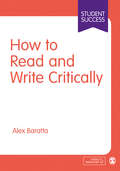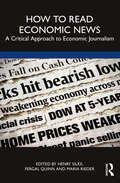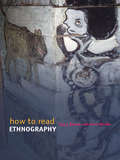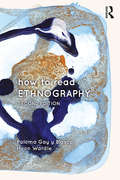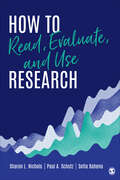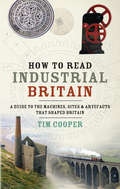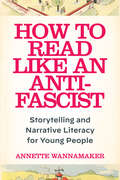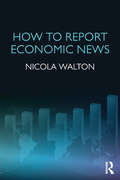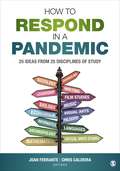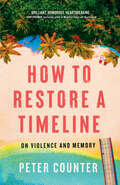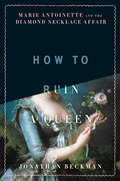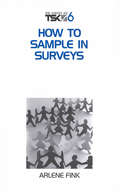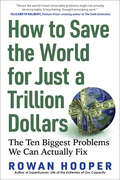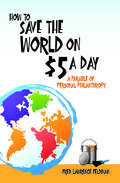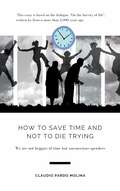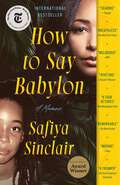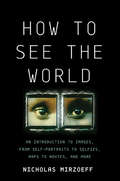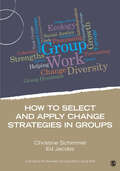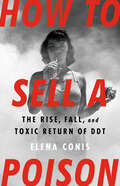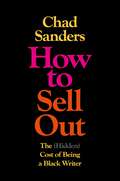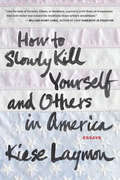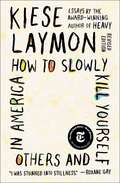- Table View
- List View
How to Read and Write Critically (Student Success)
by Alex BarattaTo succeed in any assessment, you need to demonstrate critical thinking – but what does it mean to be ‘critical’? This book takes a hands-on approach to helping you think, read and write critically. Packed with examples from different disciplines and subjects, it talks through dozens of written extracts so you can see what criticality actually looks like. The book: · Equips you with tools for making an argument, explaining your reasoning and using examples to illustrate your points. · Enables you to structure coherent arguments and choose appropriate language. · Helps you interpret and apply feedback from your lecturers. For undergraduate students studying in any discipline, this clear guide takes the confusion out of reading and writing critically so you can approach your assessments with confidence.
How to Read Economic News: A Critical Approach to Economic Journalism
by Henry Silke Fergal Quinn Maria RiederClosely examining how the news media reports economic and financial matters, this book equips students with solid methodological skills for reading and interpreting the news alongside a toolkit for best practice as an economic journalist. How to Read Economic News combines theory and practice to explore the discourse surrounding economics in the mass media and how this specialised form of reporting can be improved. Beginning by introducing major concepts such as financialised economic reporting, media amnesia and loss of trust, the book goes on to help students to interpret, understand and analyse existing news discourse and to identify subtle biases in news reports stemming from hegemonic belief systems. The final section puts this analytical knowledge into practice, providing students with methods for the critical production of news and covering such skills as identifying newsworthiness, story sourcing, achieving clarity, and using complex datasets in news stories. This is a key text for students and academics in the fields of financial journalism and critical discourse analysis who wish to approach the subject with a critical eye.
How to Read Ethnography
by Paloma Gay y Blasco Huon Wardle Paloma Gay BlascoHow to Read Ethnography is an invaluable guide to approaching anthropological texts. Laying bare the central conventions of ethnographic writing, it helps students to develop a critical understanding of texts and explains how to identify and analyse the core ideas in order to apply these ideas to other areas of study. Above all it enables students to read ethnographies anthropologically and to develop an anthropological imagination of their own. Combining lucid explanations with selections from key texts, this excellent guide is ideal reading for those new to the subject or in need of a refresher course. Includes excerpts from key ethnographies Offers balanced and progressive reader activities and exercises Provides reading exercises, a glossary and full chapter summaries Teaches an independent approach to the study of anthropology
How to Read Ethnography
by Huon Wardle Paloma Gay y BlascoHow to Read Ethnography is an essential guide to approaching anthropological texts. It helps students to cultivate the skills they need to critically examine and understand how ethnographies are built up, as well as to think anthropologically and develop an anthropological imagination of their own. The authors reveal how ethnographically-informed anthropology plays a distinctive and valuable role in comprehending the complexity of the world we live in. This fully revised second edition includes fresh excerpts from key texts for analysis and comparison along with lucid explanations. In addition to concerns with argument, authority, and the relationship between theory and data, the book engages with the purpose, value, and accountability of ethnographic texts, as well as with their reception and usage. A brand new chapter looks at the kinds of collaboration between informants/consultants and anthropologists that go into the making of ethnographic writing.
How to Read, Evaluate, and Use Research
by Sharon L. Nichols Paul A. Schutz Sofia BahenaThis text helps students learn how to select, read, understand, and evaluate the research they read. Many texts focus on the process of conducting research and not as much on how students in applied disciplines can assess and apply that research in their future professional lives; this text aims to fill that gap. Organized in the same way as a research article, the book includes a chapter on literature reviews and research questions, followed by three methods chapters (quantitative, qualitative, and mixed methods), and a chapter on research conclusions and implications. The book includes a wealth of pedagogical features including Learning Objectives, Check Your Understanding questions, a Guided Application exercise in each chapter, suggested further reading, and a glossary. Three research articles, used as exemplars throughout, are included in the appendix to the book.
How to Read, Evaluate, and Use Research
by Sharon L. Nichols Paul A. Schutz Sofia BahenaThis text helps students learn how to select, read, understand, and evaluate the research they read. Many texts focus on the process of conducting research and not as much on how students in applied disciplines can assess and apply that research in their future professional lives; this text aims to fill that gap. Organized in the same way as a research article, the book includes a chapter on literature reviews and research questions, followed by three methods chapters (quantitative, qualitative, and mixed methods), and a chapter on research conclusions and implications. The book includes a wealth of pedagogical features including Learning Objectives, Check Your Understanding questions, a Guided Application exercise in each chapter, suggested further reading, and a glossary. Three research articles, used as exemplars throughout, are included in the appendix to the book.
How to Read Industrial Britain
by Tim CooperFrom steam engines and suspension bridges to canals, factories and pubs, the Industrial Revolution of the 18th and 19th centuries transformed the social and material landscape of Britain. Yet how many of us know why our local pub looks the way it does or why a railway station might resemble a cathedral? This book reveals how, by 'reading' buildings, structures and townscapes, we can understand their context and significance for the society that created them.Author Tim Cooper uses themes including transport, education and religion to show how the geographical and architectural remains of industrial Britain have shaped us as a people. He sheds light on how and why the pioneers of the Industrial Revolution redesigned our towns and countryside, and draws on a wealth of British sites to explain, for instance, how canals were instrumental in the expansion of industry, or why affluent suburbs are usually situated in the west end of a town.This book is a joy for anyone wanting to investigate our industrial heritage and discover the secret history behind familiar, everyday features of our urban and rural landscapes.
How to Read Like an Anti-Fascist: Storytelling and Narrative Literacy for Young People
by Annette WannamakerOn the urgent need to promote critical reading skills amidst rising authoritarianismChildren’s author Philip Pullman famously said that “There are some themes, some subjects, too large for adult fiction; they can only be dealt with adequately in a children’s book.” While the recent rise of fascist ideology in the United States might seem a subject too large and adult to be dealt with in literature for children or teens, Annette Wannamaker proposes in How to Read Like an Anti-Fascist that there are books aimed at future generations which critique and counter fascist propaganda and mythmaking.Works of literature can reflect fascist ideology and promote it as well, but Wannamaker proposes that some books also offer tools for understanding it. Books written for beginners can introduce readers to complex concepts, break big ideas into manageable parts, and teach readers how to read the world outside of the book. Antifascist books are ones that analyze fascistic rhetoric and storytelling, educate about America’s long history of authoritarianism, and highlight various facets of fascism such as scapegoating others and reasserting patriarchal power.From “The Emperor’s New Clothes” and the tales of Superman to Mildred Taylor’s Roll of Thunder, Hear My Cry, the 1619 Project and contemporary works such as All Boys Aren’t Blue and Donald Builds the Wall, Wannamaker shows how the ethos of authoritarianism is characterized by a strict hierarchy that places children at its very bottom. In doing so, she argues convincingly that books written for young people can provide a particular view from the bottom, a perspective well-suited to interrogating systems of power.
How to Report Economic News
by Nicola WaltonSince the global financial crisis in 2008, economics has dominated the news agenda, with issues such as migration, growth, trade and unemployment remaining hotly debated in the media. How to Report Economic News is an accessible introduction to our contemporary economic landscape and journalistic approaches to economic news coverage. Nicola Walton, an experienced financial journalist, presents a comprehensive guide to important economic indicators and how to report on them, as well as giving advice on identifying essential facts needed for any economic news story. The author also offers useful tips on journalistic writing that can help ensure articles are written clearly, concisely and with precision. To provide readers with further guidance, each chapter concludes with assignments to test your knowledge, a resource list for further reading and a glossary of key terms. Chapters cover key topics including inflation, monetary policy, labour markets, fiscal policy and residential property markets. The book takes the UK economy as its main focus, but also explores European, US and Japanese markets in depth. In addition, the title explores other major global topics such as the rise of Brazil, Russia, India, China (BRIC) economies and the role of multinational organisations such as the International Monetary Fund. By combining an overview of current financial systems and economic developments with instruction on economic reporting, this title is a valuable resource for students of Journalism, trainee journalists, as well as anyone interested in learning more about modern economics.
How to Respond in a Pandemic: 25 Ideas from 25 Disciplines of Study
by Joan Ferrante Chris CaldeiraHow can an undergraduate college education prepare learners to cope with the current COVID-19 pandemic? This collection of short essays, written by experts in 25 academic fields of study, addresses this very question. Each chapter brings perspective and insight from that discipline, presenting one useful idea and a recommended course of action. This one-of-a-kind resource is ideal for students, instructors, and administrators, particularly during the 2020-2021-academic year when institutions are challenged to continue their educational missions in the midst of a public health crisis that affects every aspect of college life.
How to Respond in a Pandemic: 25 Ideas from 25 Disciplines of Study
by Joan Ferrante Chris CaldeiraHow can an undergraduate college education prepare learners to cope with the current COVID-19 pandemic? This collection of short essays, written by experts in 25 academic fields of study, addresses this very question. Each chapter brings perspective and insight from that discipline, presenting one useful idea and a recommended course of action. This one-of-a-kind resource is ideal for students, instructors, and administrators, particularly during the 2020-2021-academic year when institutions are challenged to continue their educational missions in the midst of a public health crisis that affects every aspect of college life.
How to Restore a Timeline: On Violence and Memory
by Peter CounterA kaleidoscopic blend of personal essays and cultural criticism that explores the profound and occasionally horrific truths of what it means to be traumatized. When a stranger shoots his dad on a Costa Rican pier, Peter Counter hauls his blood-drenched father to safety. Returning home, Counter discovers that his sense of time and memory is shattered, and in its place is a budding new mental illness: post-traumatic stress disorder. Counter begins to see violence everywhere. From the music of Cat Stevens to Jeb Bush’s Twitter feed. Walter Benjamin to Johnny Carson. Taskmaster. Video games. ASMR videos on YouTube. The world is steeped in gore. Again and again, Counter finds himself reliving his father’s shooting as his trauma is fragmented, recast, and distorted on a compulsive mental tilt-a-whirl. Formally inventive and incisively smart, How to Restore a Timeline revels in a fragile human condition battered by real conflict and hyper-curated media portrayals of death. Channelling John Jerimiah Sullivan and Carmen Maria Machado, these essays look us dead in the eye and ask: What kind of life can we piece together amid all the carnage?
How to Romance the Man You Love--the Way He Wants You To!
by Lucy Sanna[From the book cover:] This is a book to help women to Rekindle their man's Passion for Passion. What are you waiting for? Flirt. Surprise him with a special gift, just because. Go on a date and leave the kids at home. Go for a drive and let him do all the talking. Say you'll tell him your most secret fantasy if he'll tell you his first. Enticing? Always. Romantic? Absolutely. And this is just the beginning.... Do you want romance? The answer is a resounding yes. But if you want specifics, you'll have to ask carefully. Because unless you do, most men are reluctant to open up and bare their souls. As a result, women have been forced to make assumptions and a lot of generalizations about what their partners did or didn't want. Until now. The author asked hundreds of men nationwide to share their deepest desires, their hidden fears, and their most enchanting romantic experiences. And they did, all in the name of love. The result is a delightfully empowering book that will leave you breathlessly awaiting your next romantic rendezvous. Full of activities designed to enhance your romantic spirit--and his--How to Romance the Man You Love is the key to opening doors you never dreamed existed! By reading this book, you're already showing him how much his absolute happiness means to you, which may be one of the most romantic things you'll ever do for him." Tastefully written. Check the Bookshare collection for the companion to this book: How to Romance the Woman you love--The Way She Wants You To.
How to Ruin a Queen: Marie Antoinette and the Diamond Necklace Affair
by Jonathan BeckmanA tale of greed, lust, deceit, theft on an extraordinary scale, charlatanry, kidnapping, assassination and escape from prison.
How to Sample in Surveys
by Dr Arlene G. FinkHow much is enough in your sample? What is the difference between a research question and a survey question? By exploring the answers to these questions, this book shows readers how to specify inclusion and exclusion criteria in a sample, select the appropriate probability and non-probability sampling methods, understand the sources of error in sampling, and calculate the response rate. New to this edition is coverage of sample size and power so that the reader can better understand the logic in determining the sample size to detect a difference if one exists. Filled with checklists and guidelines, this book will enable readers to select and use the most appropriate sampling methods for their survey. "Fink provides detailed descriptions of inclusion/exclusion criteria, the logic in estimating standard errors and sample size determination, and the sources of sampling errors." --Gerald Albaum, book review in Journal of Marketing Research
How to Save the World for Just a Trillion Dollars: The Ten Biggest Problems We Can Actually Fix
by Rowan HooperWhat would you do with a trillion dollars? The ultimate thought experiment opens our eyes to ten world-changing ideas within our grasp If we can come up with a trillion dollars to bail out banks, imagine what else we could do. Science journalist Rowan Hooper decided to find out, speaking with experts of all kinds about ten incredibly ambitious projects that— if realized—would secure profound, enduring benefits: trying to end global poverty, reverse climate change, extend our lifespans, refreeze the Arctic, save all endangered species, and more. Then, he dives into strategies and costs to see: How far would $1 trillion really go? You’ll have to read on to learn which project he concludes would do the most good . . . but the biggest surprise is how many astonishing advances are actually within our grasp—if we dare to reach for them.
How to Save the World on $5 a Day
by Fred Lawrence FeldmanHow to Save the World on $5 a Day provides a fascinating, multi-cultural look at the history and traditions of charitable giving, and offers innovative instruction on the theory and practice of a new form of altruism dubbed personal philanthropy - all in the form of an inspirational novelette. Designed to be read in a single sitting, this "Parable of Personal Philanthropy" uses the unexpected meeting and burgeoning romance between a passionately committed social activist named Annette and a creatively blocked artist named John to explore how even modest charitable giving can lead to personal happiness...a reinvigorated sense of self-worth... and ultimately, spiritual enlightenment. The secret is not how much you give; it's how you give... It's not about amount. It's about intent... Caring not currency... Mindfulness not money... In colorful, cliffhanger chapters that advance the story of Annette and John...bring to life charitable fables from Catholicism, Judaism, Islam and Buddhism...and introduce the reader to innovative ways to vividly experience the mental and spiritual benefits of personal philanthropy, this book offers a marvelous glimpse of life as it can be with just a slight adjustment in our perceptions and attitudes. It sends a timely and important message of hope and possibility to a worldwide audience that yearns for diverse and creative approaches on how to experience personal enlightenmentand...How to Save the World on $5 a Day.
How to Save Time and Not to Die Trying
by Claudio Pardo MolinaThis essay is based on the dialogue, On the brevity of life", written by Lucio Anne Seneca in 55 A.D. I wrote this essay adapting Seneca's dialogue; due to its impressive validity being written more than 2,000 years ago. I believe that Seneca's recommendations, adapted to current examples, enabling many people to make better decisions with the most valuable asset we have, I am referring to our time. I am interested that together discovers the immense wisdom that comes to us from the past, and that could make us avoid so much suffering from the misuse of time. Reading is listening. I guess reading that type of document is like being able to listen to the human being's experiences with a more common sense he wanted to guide us a long time ago, and whom we were not lucky enough to meet in person.
How to Say Babylon: A Memoir
by Safiya SinclairNational Book Critics Circle Award Winner A New York Times Notable Book A Read with Jenna Today Show Book Club Pick! A Best Book of 2023 by the New York Times, Time, The Washington Post, Vulture, Shelf Awareness, Goodreads, Esquire, The Atlantic, NPR, and Barack Obama With echoes of Educated and Born a Crime, How to Say Babylon is the stunning story of the author&’s struggle to break free of her rigid Rastafarian upbringing, ruled by her father&’s strict patriarchal views and repressive control of her childhood, to find her own voice as a woman and poet.Throughout her childhood, Safiya Sinclair&’s father, a volatile reggae musician and militant adherent to a strict sect of Rastafari, became obsessed with her purity, in particular, with the threat of what Rastas call Babylon, the immoral and corrupting influences of the Western world outside their home. He worried that womanhood would make Safiya and her sisters morally weak and impure, and believed a woman&’s highest virtue was her obedience. In an effort to keep Babylon outside the gate, he forbade almost everything. In place of pants, the women in her family were made to wear long skirts and dresses to cover their arms and legs, head wraps to cover their hair, no make-up, no jewelry, no opinions, no friends. Safiya&’s mother, while loyal to her father, nonetheless gave Safiya and her siblings the gift of books, including poetry, to which Safiya latched on for dear life. And as Safiya watched her mother struggle voicelessly for years under housework and the rigidity of her father&’s beliefs, she increasingly used her education as a sharp tool with which to find her voice and break free. Inevitably, with her rebellion comes clashes with her father, whose rage and paranoia explodes in increasing violence. As Safiya&’s voice grows, lyrically and poetically, a collision course is set between them. How to Say Babylon is Sinclair&’s reckoning with the culture that initially nourished but ultimately sought to silence her; it is her reckoning with patriarchy and tradition, and the legacy of colonialism in Jamaica. Rich in lyricism and language only a poet could evoke, How to Say Babylon is both a universal story of a woman finding her own power and a unique glimpse into a rarefied world we may know how to name, Rastafari, but one we know little about.
How to See the World: An Introduction to Images, from Self-Portraits to Selfies, Maps to Movies, and More
by Nicholas MirzoeffEvery two minutes, Americans alone take more photographs than were printed in the entire nineteenth century; every minute, people from around the world upload over 300 hours of video to YouTube; and in 2014, we took over one trillion photographs. From the funny memes that we send to our friends to the disturbing photographs we see in the news, we are consuming and producing images in quantities and ways that could never have been anticipated. In the process, we are producing a new worldview powered by changing demographics--one where the majority of people are young, urban, and globally connected. In How to See the World, visual culture expert Nicholas Mirzoeff offers a sweeping look at history’s most famous images--from Velázquez’s Las Meninas to the iconic "Blue Marble”--to contextualize and make sense of today’s visual world. Drawing on art history, sociology, semiotics, and everyday experience, he teaches us how to close read everything from astronaut selfies to Impressionist self-portraits, from Hitchcock films to videos taken by drones. Mirzoeff takes us on a journey through visual revolutions in the arts and sciences, from new mapping techniques in the seventeenth century to new painting styles in the eighteenth and the creation of film, photography, and x-rays in the nineteenth century. In today’s networked world, mobile technology and social media enable us to exercise "visual activism”--the practice of producing and circulating images to drive political and social change. Whether we are looking at pictures showing the effects of climate change on natural and urban landscapes or an fMRI scan demonstrating neurological addiction, Mirzoeff helps us to find meaning in what we see. A powerful and accessible introduction to this new visual culture, How to See the World reveals how images shape our lives, how we can harness their power for good, and why they matter to us all.
How to Select and Apply Change Strategies in Groups (Group Work Practice Kit)
by Christine Schimmel Ed JacobsLearn to develop key strategies and directly influence positive group culture This accessible book details the competencies, functions, and strategies that help members benefit from a positive group culture as they pursue their own learning. The authors demonstrate how group members and leaders learn and derive meaning from their group work experience. Drawing on the latest research on group work, this practical book also covers diversity and multicultural issues as well as accreditation or specialty standards. How to Select and Apply Change Strategies in Groups is part of the Group Work Practice Kit: Improving the Everyday Practice of Group Work, a collection of nine books each authored by scholars in the specific field of group work. To promote a consistent reading experience, the books in the collection conform to editor Robert K. Conyne’s outline. Designed to provide practitioners, instructors, students, and trainees with concrete direction for improving group work, the series provides thorough coverage of the entire span of group work practice. This book is endorsed by the Association for Specialists in Group Work.
How to Sell a Poison: The Rise, Fall, and Toxic Return of DDT
by Elena ConisThe story of an infamous poison that left toxic bodies and decimated wildlife in its wake is also a cautionary tale about how corporations stoke the flames of science denialism for profit.The chemical compound DDT first earned fame during World War II by wiping out insects that caused disease and boosting Allied forces to victory. Americans granted it a hero&’s homecoming, spraying it on everything from crops and livestock to cupboards and curtains. Then, in 1972, it was banned in the US. But decades after that, a cry arose to demand its return. This is the sweeping narrative of generations of Americans who struggled to make sense of the notorious chemical&’s risks and benefits. Historian Elena Conis follows DDT from postwar farms, factories, and suburban enclaves to the floors of Congress and tony social clubs, where industry barons met with Madison Avenue brain trusts to figure out how to sell the idea that a little poison in our food and bodies was nothing to worry about.In an age of spreading misinformation on issues including pesticides, vaccines, and climate change, Conis shows that we need new ways of communicating about science—as a constantly evolving discipline, not an immutable collection of facts—before it&’s too late.
How to Sell Out: The (Hidden) Cost of Being a Black Writer
by Chad SandersA timely, vulnerable, and cutting-edge exploration of the pressures and pitfalls of writing while Black in America in this urgently needed addition to the national conversation of race, money, and art.In the summer of 2020, when the nation was erupting in protest over the murder of George Floyd, Chad Sanders was quietly celebrating for selfish reasons. Why? After years of struggling to get his footing as a writer, he&’d finally landed a New York Times op-ed. He wrote an essay about the hollow messages of concern he&’d been receiving from white friends and colleagues. It went viral, and in the years that followed, he built a solid career as a creator—of books, podcasts, TV shows, and films—by mining his most painful experiences of being Black in America. Black pain for white money. For Sanders, this was a lucrative trade. One he thought he could work for the rest of his life. But it didn&’t take long for him to realize he, like so many other writers, was getting the short end of the stick. In How to Sell Out, Sanders draws on his personal experiences to offer a wry, darkly comic look at the invisible realities of making a living as a Black writer who writes about race. He relays stories of his time in the tech business, his experiences in TV writers&’ rooms, his childhood participation in Jack and Jill, his family and relationships, and the struggles of sharing his racial trauma in exchange for cash. Combining meditations on historical and current events and the intersection of race and class with short creative essays, Sanders sculpts a freewheeling arc that is as funny as it is moving and thought-provoking.
How to Slowly Kill Yourself and Others in America
by Kiese LaymonAuthor and essayist Kiese Laymon is one of the most unique, stirring, and powerful new voices in American social and cultural commentary. How to Slowly Kill Yourself and Others in America is a collection of Laymon's essays, touching on subjects ranging from family, race, violence, and celebrity to music, writing, and coming of age in the rural Mississippi Gulf Coast. Laymon's writing is unflinchingly honest, while also being smart, lacerating, and unexpectedly funny.In How to Slowly Kill Yourself and Others in America, Laymon deals in depth with his own personal story, which is filled with trials (and reflections on those trials) that illuminate under-appreciated aspects of contemporary American life. As revealed in the book's title essay, Laymon attended three colleges before earning his undergraduate degree. He was suspended from the first of these institutions, Millsaps College, following a probationary period resulting from a controversial essay he published on campus. As the school's president described it, the "Key Essay in question was written by Kiese Laymon, a controversial writer who consistently editorializes on race issues." Controversy seemed to follow this young writer, but as he himself puts it, "my job is to ask questions, to broaden the scope of American literature by broadening the scope of who is written to and imaginatively writes back."Laymon voice is something new and unexpected in contemporary American writing, mixing a colloquial voice with acerbic wit, sharp insights, and blast-furnace heat that calls to mind no one so much as a black 21st-century Mark Twain. Much like Twain, Laymon's writing is steeped in controversial issues both private and public. From his biting critiques of race politics to revelations of his own internal struggles with American "blackness," Laymon taps into an ongoing conversation that is played out consciously and subconsciously across all of our artistic, cultural, political, and economic realities.This collection introduces Laymon as a writer who balances volatile concepts on a razor's edge, and who chops up much-discussed and often-misunderstood topics with his scathing humor and fresh, unexpected takes on the ongoing absurdities, frivolities, and calamities of American life.
How to Slowly Kill Yourself and Others in America: Essays
by Kiese LaymonA New York Times Notable Book A revised collection with thirteen essays, including six new to this edition and seven from the original edition, by the &“star in the American literary firmament, with a voice that is courageous, honest, loving, and singularly beautiful&” (NPR).Brilliant and uncompromising, piercing and funny, How to Slowly Kill Yourself and Others in America is essential reading. This new edition of award-winning author Kiese Laymon&’s first work of nonfiction looks inward, drawing heavily on the author and his family&’s experiences, while simultaneously examining the world—Mississippi, the South, the United States—that has shaped their lives. With subjects that range from an interview with his mother to reflections on Ole Miss football, Outkast, and the labor of Black women, these thirteen insightful essays highlight Laymon&’s profound love of language and his artful rendering of experience, trumpeting why he is &“simply one of the most talented writers in America&” (New York magazine).
